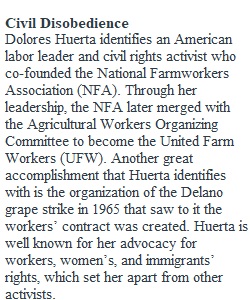


Q Remember the word "Kafkaesque," coined after the 20th century writer Franz Kafka? • It means "having a nightmarishly complex, bizarre, or illogical quality (Links to an external site.)", and often refers to bureaucracies and other vast social structures that are oppressive to the individual. One way to respond to a Kafkaesque situation is with civil disobedience, a term coined in an 1849 essay (Links to an external site.) by the 19th-century American Transcendentalist philosopher Henry David Thoreau. • Civil disobedience is ancient -- see the first chapter of Exodus in the Hebrew Bible, where the midwives disobey the pharaoh, refusing to kill the Hebrew male children, and then dissemble about their disobedience. (See Exodus 1:15-19 (Links to an external site.)) • Civil disobedience is still with us today, as suggested in the short BBC video below that traces the idea from Henry David Thoreau, through Mahatma Gandhi, Rosa Parks, and Martin Luther King, Jr., up to climate change protesters and the "occupy" movement. • A recent and widely-publicized reincarnation of civil disobedience is perhaps in the "cancel culture" movement that is currently a fault-line in the fracture of American politics. Dolores Huerta Let's focus on noted civil rights leader Dolores Huerta. Here is a four-minute bio: Here is an interview with Huerta in 2012, after she won the Presidential Medal of Freedom Other resources Consult some or all of these resources -- it might be a good idea to read the directions below first, so that you can read strategically and look for information to inform your discussion post. Resources about workers in the food supply chain: • Prayer of the Farm Workers’ Struggle / Oración del Campesino en la Lucha (Links to an external site.) (UFW.org) • Will Grocery Workers Still Be ‘Heroes’ When COVID-19 Subsides? (Links to an external site.) (TexasObserver.org; May 1, 2020) • A College Grad Honored Her Parents With A Photo Shoot In The Fields Where They Worked (Links to an external site.) (TPR.org; June 18, 2021) — especially the following paragraph: o “When people go to the grocery store, [they] just grab vegetables and food without really putting thought into it,” she says, sounding frustrated. “They don’t think, there are people that are drastically working hard and in hazardous conditions just to make sure that we have these foods accessible.” Resources about civil disobedience: • Philosophical consideration (Links to an external site.) about civil disobedience in a democratic society -- is it morally justifiable? (Earlham.edu) • Techniques and outcomes (Links to an external site.) of civil disobedience, from the Texas Politics Project (UTexas.edu) • Historian Howard Zinn (Links to an external site.) arguing for the necessity of civil disobedience in 1971, during the Vietnam War (YouTube) Directions Write three paragraphs: First paragraph: summarize the life and work of Dolores Huerta in a few sentences. • Why is she worth knowing about, and what is any meaningful respect in which she resembles Antigone? • ("Meaningful" means that it helps to illustrate the "big idea" of Antigone, and the "big idea" of Dolores Huerta.) • Be sure to make the connection with Antigone -- your connection is where the "rubber meets the road" in this paragraph. Second paragraph: consider the big picture of the global food supply, its laborers and its consumers. • As long as we have a ready supply of food for ourselves and our families, do consumers of food have any moral obligation to workers who are basically invisible? • For example, farmworkers, slaughterhouse workers, grocery store workers, and any other labor in the vast machinery of the global food production system. • Why or why not? Explain in a few sentences. Think about someone who has the opposite point of view you have, and try to convince that person. Third paragraph: consider the problem of hunger and "food insecurity" in San Antonio. • We probably all know San Antonio has recently received national attention for the lines of cars (Links to an external site.) at the food bank. • Suppose you wanted to use civil disobedience or another form of protest to address the problem of hunger and food insecurity. (Perhaps you do, or perhaps you don't. But suppose.) Explain in some detail what form of civil disobedience or protest might be effective. o (Note: we are about to cover Martin Luther King's Letter from Birmingham Jail (Links to an external site.). Even though we have not studied it yet, you might consider this line: "In any nonviolent campaign there are four basic steps: collection of the facts to determine whether injustices exist; negotiation; self purification; and direct action") Finally, reply to TWO classmates, commenting on something insightful you found in the other student's post, and writing enough (c. 100 words) to carry the conversation forward. Considerations of substance and style • Do NOT copy the instructions in your discussion post. I want to hear your words, not mine, when I read your post! • As always in this class, be sure to write more than one paragraph. • Be sure to give reasons for your assertions. Write enough to develop a point. • Be sure to reply to classmates. This assignment is a discussion, not a monologue!
View Related Questions